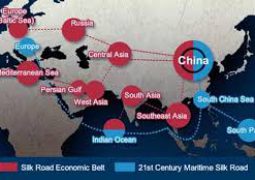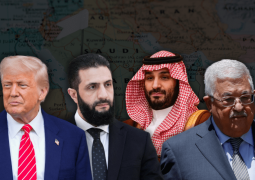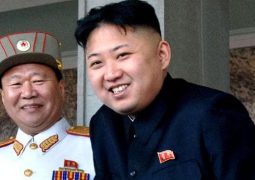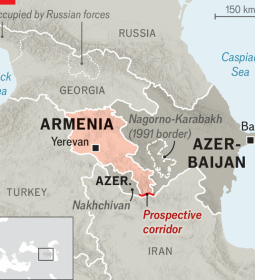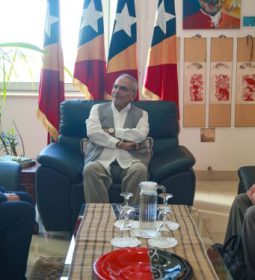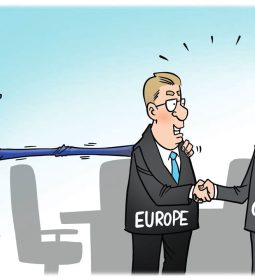The Reasons Behind The Turkmen-Tajik Tiff
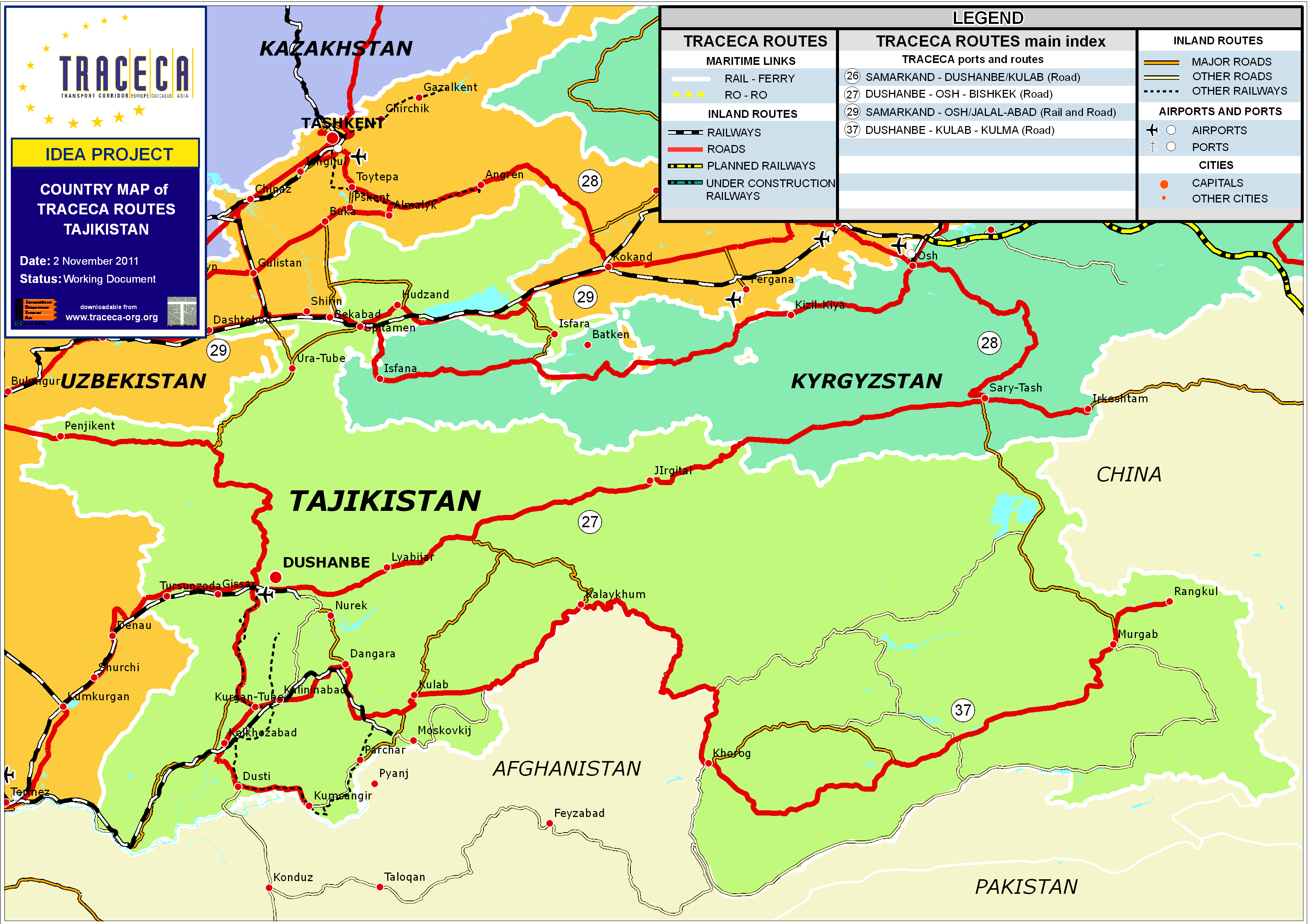
A recent spat between Turkmenistan and Tajikistan is probably the lamest dispute between two Central Asian countries I can remember, though I think I know the real cause of the problem.
Tajikistan is talking about constructing a new railway line that would connect the country to Russia via Uzbekistan. Some poorly considered language was used in the statement about this project and that was seized upon by Turkmenistan’s Foreign Ministry, which fired off an equally ill-advised statement rebuking Tajikistan.
And while Tajikistan might technically have started this row, I get the feeling nerves are becoming frayed in Ashgabat these days over more important matters than a new railway line from Tajikistan to Russia.
In a January 24 statement, the deputy head of Tajikistan’s state railway company, Usmon Kalandarov, mentioned the proposed new railway line that “bypasses Turkmenistan.”
On January 25, the Turkmen Foreign Ministry released a statement calling Kalandarov’s comments “unethical” and “unfriendly.”
The Turkmen Foreign Ministry expressed bewilderment (they do that a lot in their statements, makes me wonder) and reminded that “Turkmenistan has initiated a number of specific projects that involve Tajikistan and are aimed at further expanding cooperation between the two countries in the transport and communication spheres.”
The Foreign Ministry added: “This statement by one of the leaders of the Tajik railways does not contribute to the practical efforts to achieve the above mentioned objectives.”
Assuredly not, but a quick look at the map shows there would be no reason for a railway from Tajikistan through Uzbekistan and on to Russia to ever pass through Turkmenistan. The line would have to be extended much farther west to incorporate Turkmenistan.
So the project itself doesn’t seem to be the problem. It seems more to be that a Tajik state official publicly mentioned Turkmenistan being left out of the project.
That is what has irritated the Turkmen government and spurred a response from the Foreign Ministry.
International rights organizations mention Turkmenistan critically all the time, but governments do not. For most of its 25 years as an independent country, Turkmenistan’s isolationism, couched as a state policy of “positive neutrality,” has kept the country out of international arguments, conflicts, and alliances. The name “Turkmenistan” just doesn’t come up too much when top officials in other countries make policy statements.
But that has changed lately.
At the start of January, Iranian officials launched a verbal attack on Turkmenistan after Ashgabat shut off (Turkmen authorities say “limited”) gas supplies to Iran over an unpaid debt.
The National Iranian Gas Company issued statements indicating Turkmenistan was violating their contract and threatened to take Turkmenistan to arbitration, which finally prompted the Turkmen Foreign Ministry to issue two separate responses in a 24-hour-period to defend Turkmenistan’s position that Iran was in the wrong.
One year ago, Turkmen authorities were issuing similar statements after Russia’s Gazprom tore up gas agreements with Turkmenistan and refused to import any more Turkmen gas citing, very publicly, Ashgabat’s “intractable” position in negotiating prices.
And before that, there were Kazakh President Nursultan Nazarbaev’s comments in mid-October 2015, right after a meeting with Russian President Vladimir Putin, that the security situation along Turkmenistan’s border with Afghanistan was troubling.
The Turkmen Foreign Ministry released a statement that same day that read, “The Turkmen side expresses its extreme bewilderment (eds: what did I tell you?) and concern at this statement by the Kazakh side which is irrelevant to the situation on the state border of Turkmenistan.”
The statement went on to recommend Nazarbaev and others receive their information from more credible sources in the future, ignoring the fact that the Afghan government and media were acknowledging there was fighting in northwest Afghanistan near the border with Turkmenistan.
Russia’s Federal Security Service and the Russian-led Collective Security Treaty Organization, which does not include Turkmenistan, have also expressed concerns similar to Nazarbaev’s since October 2015.
Turkmen-Tajik relations probably won’t be affected much by this recent tiff. There was a meeting of the Turkmen-Tajik intergovernmental commission on trade-economic and scientific-technical cooperation in Ashgabat on January 26-27.
And the Turkmen Foreign Ministry was correct in pointing out it “has initiated a number of specific projects that involve Tajikistan” that are aimed at furthering cooperation between the two countries. Turkmenistan has offered to supply Tajikistan with electricity and oil but so far this has been impossible due to Uzbekistan’s refusal to allow these exports through its territory.
That is the reason Turkmenistan and Tajikistan agreed to build the Turkmenistan-Afghanistan-Tajikistan (TAT) railway line that finally made it from Turkmenistan into Afghanistan at the end of 2016.
Turkmen authorities might now wonder if Tajikistan could lose interest in TAT should the new railway project from Tajikistan through Uzbekistan advance.
Of course, now that Uzbekistan has a new president, Shavkat Mirziyaev, who has vowed to improve ties with Central Asian neighbors, new opportunities for cooperation between Turkmenistan and Tajikistan could open up and TAT could soon become TUT (Turkmenistan-Uzbekistan-Tajikistan), a shorter and much more secure route.
Turkmenistan’s diplomatic problems are coming at the same time economic problems are hammering Turkmenistan.
The latest blow is the January 27 reports from Pakistani media that the Turkmenistan-Afghanistan-Pakistan-India (TAPI) gas pipeline will be delayed by one year due to problems with financing (Qishloq Ovozi says even that is overly optimistic). Turkmen President Gurbanguly Berdymukhammedov has been promising for several years that TAPI would start operations by 2019 and Turkmenistan would have a new export route for 33 billion cubic meters (bcm) of its gas annually.
Turkmenistan needs TAPI after losing Russia, and probably Iran soon as customers, two countries that 10 years ago combined for nearly 50 bcm of Turkmen gas sales.
So the Turkmen Foreign Ministry’s terse statement to Tajikistan might have been ill advised but it is to some extent understandable. Almost nothing seems to be going right for Turkmenistan lately.
With material from RFE/RL’s Turkmen Service, known locally as Azatlyk, and Tajik Service, known locally as Ozodi
- Previous Gabbard allies rush to her defense after Assad meeting
- Next Japan to explain facts about its auto market to Trump



